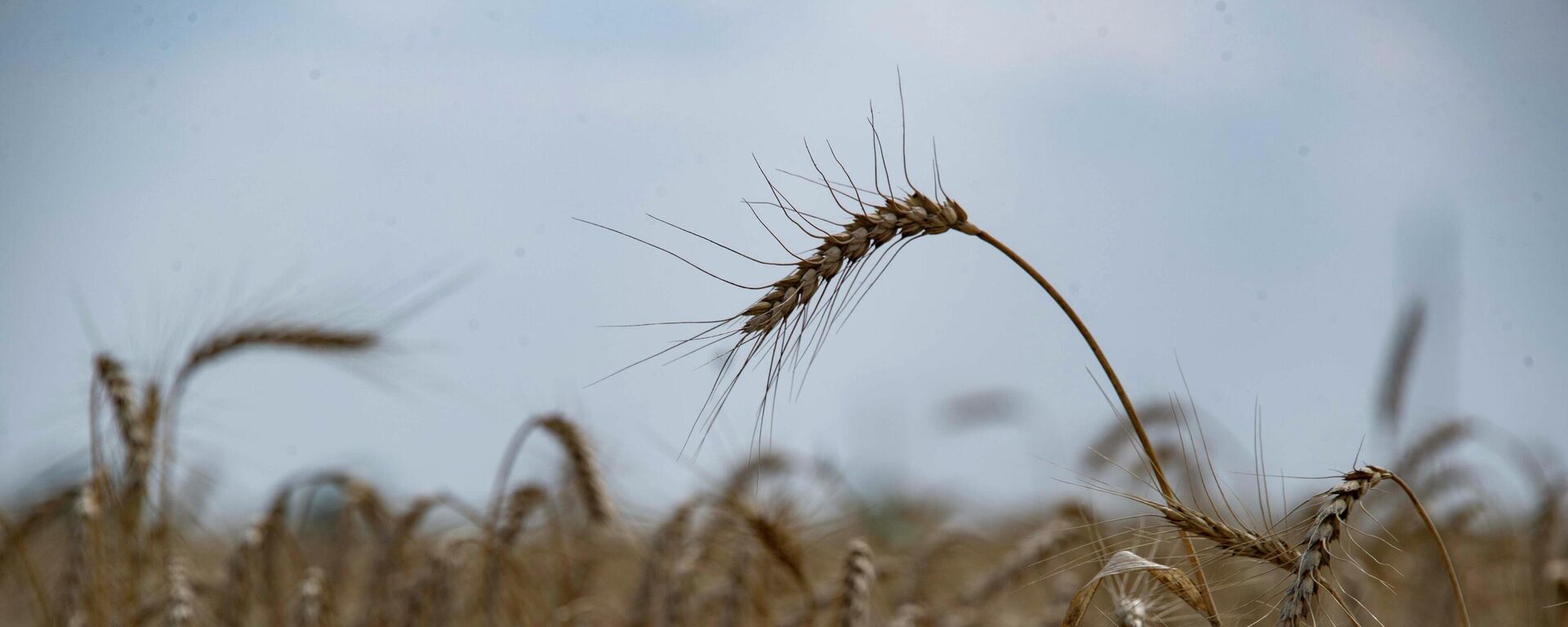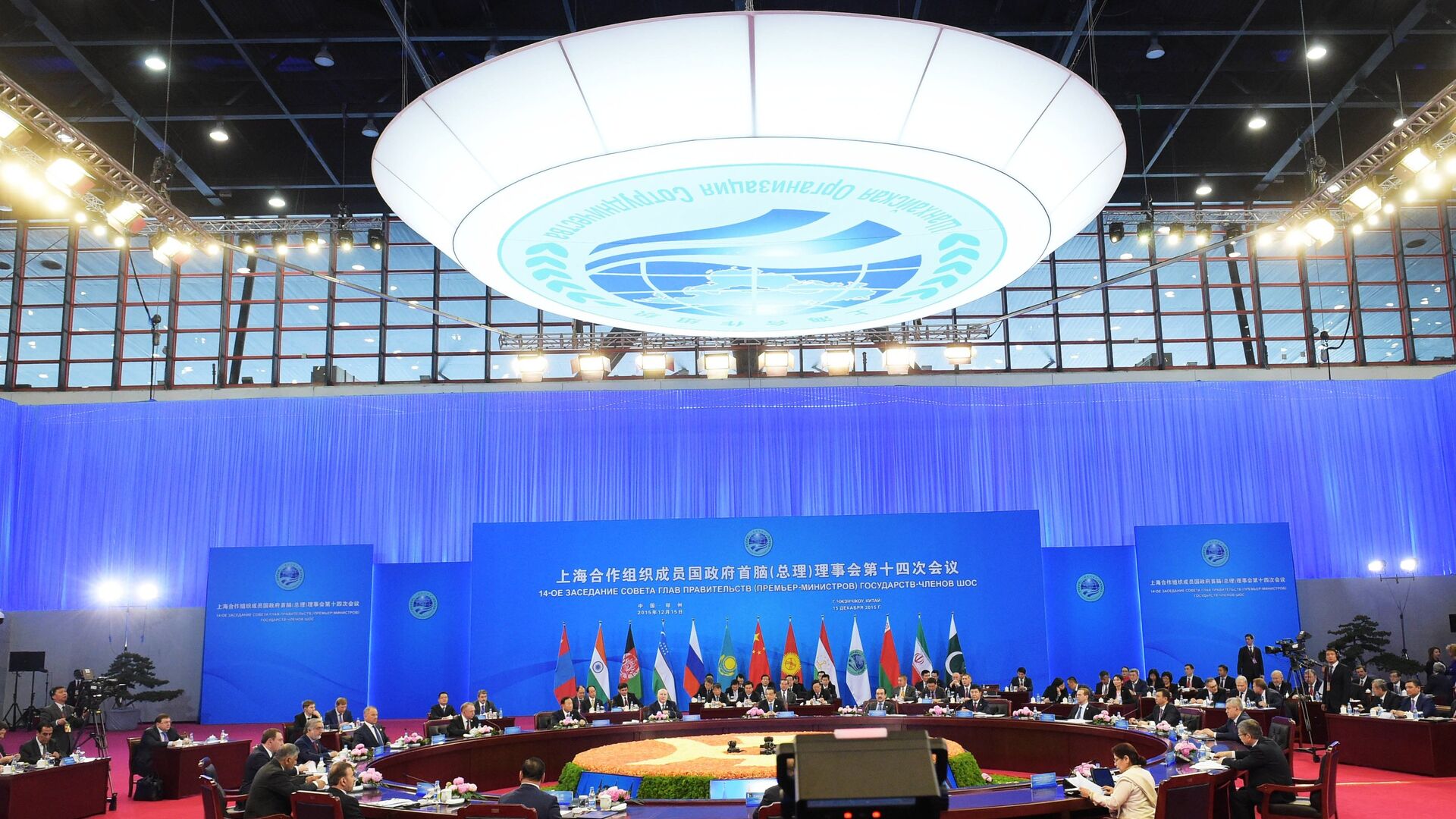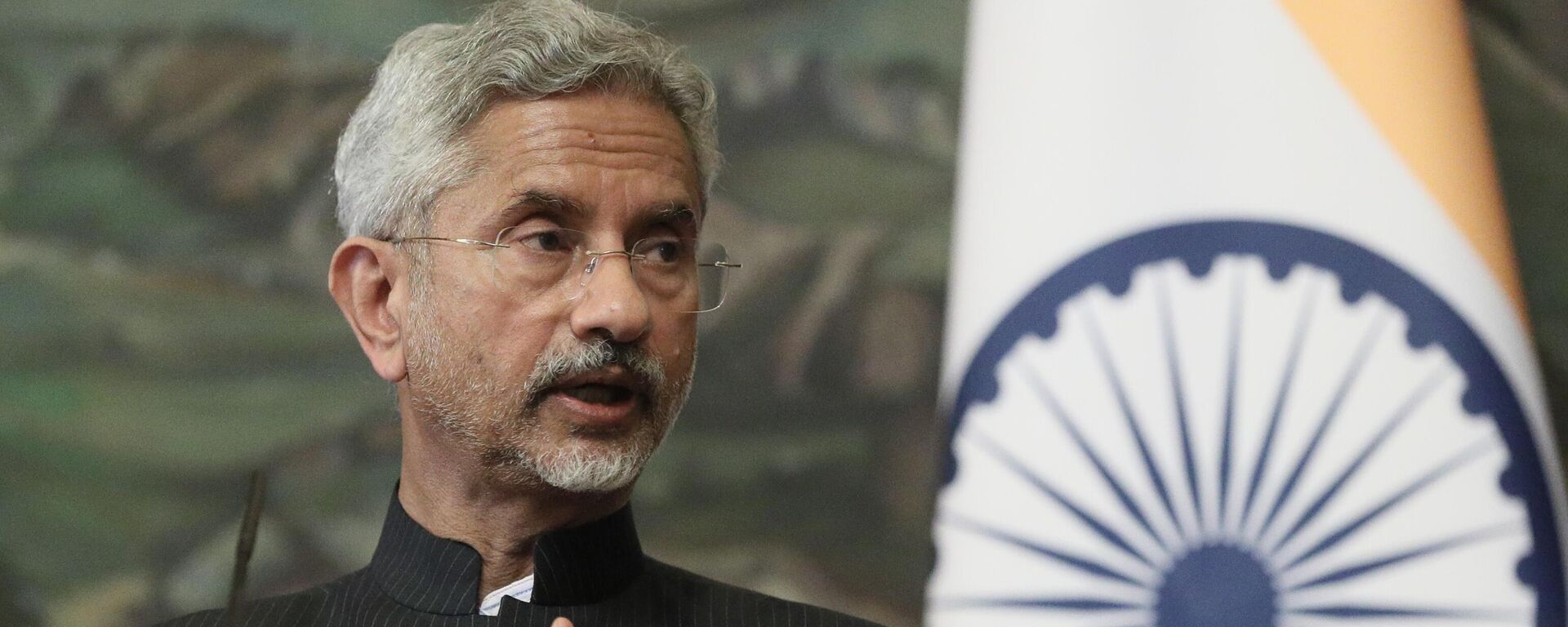https://sputnikglobe.com/20220912/scos-global-role-becoming-more-significant-in-the-wake-of-ukraine-crisis-indian-ex-envoy-says-1100676493.html
SCO's Global Role Becoming 'More Significant' in the Wake of Ukraine Crisis, Indian Ex-Envoy Says
SCO's Global Role Becoming 'More Significant' in the Wake of Ukraine Crisis, Indian Ex-Envoy Says
Sputnik International
The Uzbek government has said that 15 heads of states will attend the upcoming meeting of the Shanghai Cooperation Organisation (SCO) in Samarkand on September... 12.09.2022, Sputnik International
2022-09-12T13:15+0000
2022-09-12T13:15+0000
2022-10-19T20:56+0000
shanghai cooperation organisation (sco)
terrorism
afghanistan
iran
narendra modi
sco summit in samarkand
interviews
ukraine
https://cdn1.img.sputnikglobe.com/img/104053/52/1040535277_0:22:3057:1742_1920x0_80_0_0_42d242359b502835234913c34183b91a.jpg
Ashok Sajjanhar, former Indian ambassador to Kazakhstan, Sweden and Latvia, spoke to Sputnik about the importance of this week's SCO summit in Uzbekistan, which is set to see an expansion of the membership base of the Beijing-headquartered group through the inclusion of Iran as the ninth member.Sputnik: How do you assess the role of the Shanghai Cooperation Organization (SCO) in the current geopolitical situation? Has the grouping assumed more significance as a mark of cooperation in the Global South in the wake of the Ukraine crisis?Ashok Sajjanhar: The SCO provides a very good platform for a large number of important countries to come together and exchange important views on major global issues. I believe that although the SCO has huge potential in terms of what it can achieve, it hasn’t been able to fulfil the potential until now.Sputnik: Iran is expected to be awarded full-fledged member status at the SCO Summit this week. How would this impact the SCO's performance?Sajjanhar: Iran is a very significant actor in its own right. As far as India is concerned, Tehran is a significant partner with which we have had civilizational and historical people-to-people ties. The ties between India and Iran over the last several decades have been extremely strong and vibrant.India will definitely welcome Tehran’s greater involvement in the SCO.Now, as far as other major SCO states such as Russia and China are concerned, there is already a great deal of tension between these two countries [on the one hand] and the West [on the other hand] over the Ukraine crisis as well as US House Speaker Nancy Pelosi’s visit to Taiwan last month.And we all know about the fractious relationship between Iran and the West after the US dumped the Joint Comprehensive Plan of Action (JCPOA) in 2018, although the pact is being re-negotiated after President Joe Biden came to power.If the SCO wishes to play a meaningful role in bringing economic security, prosperity and stability in the region, then it is in SCO’s own interest to follow a middle-of-the-road approach.Sputnik: You say that the SCO might be viewed as anti-West grouping rather than be seen as promoting economic and security ties among the member countries. How should India view this development?Sajjanhar: India is of course an important country in the SCO. New Delhi has excellent relations with both Moscow and Washington. India wouldn’t like the SCO taking a particularly anti-West stance. I also believe that even the central Asian countries enjoy good relations with the West, so even these nations wouldn’t like the SCO being painted as an anti-West grouping.The interest of the Central Asian countries must reign supreme on the SCO agenda, and it is not in their interest to convert the grouping into an anti-West front.Sputnik: The meeting would be the first leaders’ summit since the Taliban* takeover of Afghanistan last August. What role do you see for the SCO in ensuring peace and stability in Afghanistan? How do you see the goals of the SCO vis-a-vis the West different when it comes to Afghanistan?Sajjanhar: As far as Afghanistan is concerned, I believe the policies of the West and that of the SCO states are quite similar. In my view, the policies are reflected in the UN Security Council resolution 2593 that was accepted last year on 30 August when New Delhi was the chair of the UNSC.Resolution 2593 reflects the commitments made by the Taliban — not allowing terrorist activity against other countries on the Afghan soil, respecting the rights of minorities and women — at the Doha peace agreement in February 2020.The SCO should encourage the Taliban to move in that direction. The presence and subsequent killing in a US drone strike of former Al-Qaeda** emir Ayman al-Zawahiri in Kabul defied Taliban’s previous claims that it won’t allow terrorist groups to operate in Afghanistan.[Ed. note: The Taliban has denied the US claim and is currently investigating the incident.]There is also the presence of other terrorist groups such as Jaish-e-Mohammad** and Lashkar-e-Taiba** (LeT) which have been of particular concern to India.I believe that the SCO must spell out clearly at the summit as to what it wants from the Taliban if Afghanistan has to be rehabilitated in the global community.Sputnik: Pakistan has not only not allowed India to reach the Central Asia through the land route, but there are also concerns in India about Islamabad's role in allegedly abetting terrorism against New Delhi. How successful has the SCO been in addressing these concerns, given counter terror cooperation and connectivity are its major agenda items?Sajjanhar: Without naming Pakistan, India has regularly highlighted the issue of cross-border terrorism at various international platforms as well as during its bilateral engagements. I believe that Prime Minister Modi will raise the same issue in Samarkand.As far as connectivity is concerned, I don’t see a major role of Pakistan as far as India’s connectivity initiatives are concerned.However, India is definitely going to project its other initiatives such as the usefulness of the port of Chabahar in boosting regional connectivity. We also have a stake in the International North South Transport Corridor (INSTC), which is also an important initiative. The central Asian countries such as Uzbekistan, many of which are land-locked, have also been very supportive of these initiatives.So, the SCO must also become a platform to promote these connectivity projects and not just the Belt and Road Initiative (BRI).Sputnik: Russia and Iran are both major energy exporters. However, the West has discouraged energy exports from these countries, which India has said fuelled the ongoing energy crisis. Do you think there is a case for greater energy cooperation among the SCO states in view of high fuel prices?Sajjanhar: Let me start by stating that the G7’s cap on Russian oil prices is not a very feasible idea. Then, there are also negotiations for getting gas to India from central Asia through the TAPI pipeline (Turkmenistan-Afghanistan-Pakistan-India).However, to respond to your broader question on if the SCO could serve as a platform for energy deals, I would say that these pacts are more of bilateral in nature. There have been proposals to establish an ‘SCO Energy Club’, but that hasn’t gained much traction so far.But, definitely, bilateral conversation to expand energy cooperation among individual SCO states are expected to take place parallelly to multilateral conversations.*The Taliban is under UN sanctions for terrorist activities.**Al-Qaeda, Jaish-e-Mohammad and Lashkar-e-Taiba (LeT) are terrorist groups banned in many nations, including Russia.
https://sputnikglobe.com/20220729/irans-accession-to-sco-will-increase-groupings-influence-globally-indian-fm-says-1097938795.html
https://sputnikglobe.com/20220907/putin-erdogan-may-discuss-grain-deal-on-sidelines-of-sco-summit-in-samarkand-source-says-1100479550.html
afghanistan
iran
ukraine
Sputnik International
feedback@sputniknews.com
+74956456601
MIA „Rossiya Segodnya“
2022
News
en_EN
Sputnik International
feedback@sputniknews.com
+74956456601
MIA „Rossiya Segodnya“
Sputnik International
feedback@sputniknews.com
+74956456601
MIA „Rossiya Segodnya“
shanghai cooperation organisation (sco), terrorism, afghanistan, iran, narendra modi, interviews, ukraine
shanghai cooperation organisation (sco), terrorism, afghanistan, iran, narendra modi, interviews, ukraine
SCO's Global Role Becoming 'More Significant' in the Wake of Ukraine Crisis, Indian Ex-Envoy Says
13:15 GMT 12.09.2022 (Updated: 20:56 GMT 19.10.2022) Exclusive
The Uzbek government has said that 15 heads of states will attend the upcoming meeting of the Shanghai Cooperation Organisation (SCO) in Samarkand on September 15-16. This will be the first in-person gathering of the SCO leaders since 2019.
Ashok Sajjanhar, former Indian ambassador to Kazakhstan, Sweden and Latvia, spoke to Sputnik about the importance of this week's SCO summit in Uzbekistan, which is set to see an expansion of the membership base of the Beijing-headquartered group through the inclusion of Iran as the ninth member.
Sputnik: How do you assess the role of the Shanghai Cooperation Organization (SCO) in the current geopolitical situation? Has the grouping assumed more significance as a mark of cooperation in the Global South in the wake of the Ukraine crisis?
Ashok Sajjanhar: The SCO provides a very good platform for a large number of important countries to come together and exchange important views on major global issues. I believe that although the SCO has huge potential in terms of what it can achieve, it hasn’t been able to fulfil the potential until now.
However, under the current circumstances when there is geopolitical turmoil owing to the Ukraine crisis as well as the tensions over Taiwan, the in-person meeting of the SCO member countries will be extremely significant.
Sputnik: Iran is expected to be awarded full-fledged member status at the SCO Summit this week. How would this impact the SCO's performance?
Sajjanhar: Iran is a very significant actor in its own right. As far as India is concerned, Tehran is a significant partner with which we have had civilizational and historical people-to-people ties. The ties between India and Iran over the last several decades have been extremely strong and vibrant.
India will definitely welcome Tehran’s greater involvement in the SCO.
Now, as far as other major SCO states such as Russia and China are concerned, there is already a great deal of tension between these two countries [on the one hand] and the West [on the other hand] over the Ukraine crisis as well as US House Speaker Nancy Pelosi’s visit to Taiwan last month.
And we all know about the fractious relationship between Iran and the West after the US dumped the Joint Comprehensive Plan of Action (JCPOA) in 2018, although the pact is being re-negotiated after President Joe Biden came to power.
If the SCO wishes to play a meaningful role in bringing economic security, prosperity and stability in the region, then it is in SCO’s own interest to follow a middle-of-the-road approach.
Sputnik: You say that the SCO might be viewed as anti-West grouping rather than be seen as promoting economic and security ties among the member countries. How should India view this development?
Sajjanhar: India is of course an important country in the SCO. New Delhi has excellent relations with both Moscow and Washington. India wouldn’t like the SCO taking a particularly anti-West stance. I also believe that even the central Asian countries enjoy good relations with the West, so even these nations wouldn’t like the SCO being painted as an anti-West grouping.
One has to recognize that as groupings in South-East Asia have to be ASEAN-centric in order to gain the trust of the international community, then the SCO must be Central Asia-centric.
The interest of the Central Asian countries must reign supreme on the SCO agenda, and it is not in their interest to convert the grouping into an anti-West front.
Sputnik: The meeting would be the first leaders’ summit since the Taliban* takeover of Afghanistan last August. What role do you see for the SCO in ensuring peace and stability in Afghanistan? How do you see the goals of the SCO vis-a-vis the West different when it comes to Afghanistan?
Sajjanhar: As far as Afghanistan is concerned, I believe the policies of the West and that of the SCO states are quite similar. In my view, the policies are reflected in the UN Security Council resolution 2593 that was accepted last year on 30 August when New Delhi was the chair of the UNSC.
Resolution 2593 reflects the commitments made by the Taliban — not allowing terrorist activity against other countries on the Afghan soil, respecting the rights of minorities and women — at the Doha peace agreement in February 2020.
The SCO should encourage the Taliban to move in that direction. The presence and subsequent killing in a US drone strike of former Al-Qaeda** emir Ayman al-Zawahiri in Kabul defied Taliban’s previous claims that it won’t allow terrorist groups to operate in Afghanistan.
[Ed. note: The Taliban has denied the US claim and is currently investigating the incident.]
There is also the presence of other terrorist groups such as Jaish-e-Mohammad** and Lashkar-e-Taiba** (LeT) which have been of particular concern to India.
And the very fact that neither any SCO member state nor the Western countries have granted diplomatic recognition to the Taliban so far also tells that both the SCO and the West are following an identical approach in their respective policy towards Afghanistan.
I believe that the SCO must spell out clearly at the summit as to what it wants from the Taliban if Afghanistan has to be rehabilitated in the global community.
Sputnik: Pakistan has not only not allowed India to reach the Central Asia through the land route, but there are also concerns in India about Islamabad's role in allegedly abetting terrorism against New Delhi. How successful has the SCO been in addressing these concerns, given counter terror cooperation and connectivity are its major agenda items?
Sajjanhar: Without naming Pakistan, India has regularly highlighted the issue of cross-border terrorism at various international platforms as well as during its bilateral engagements. I believe that
Prime Minister Modi will raise the same issue in Samarkand.
As far as connectivity is concerned, I don’t see a major role of Pakistan as far as India’s connectivity initiatives are concerned.
However, India is definitely going to project its other initiatives such as the usefulness of the port of Chabahar in boosting regional connectivity. We also have a stake in the International North South Transport Corridor (INSTC), which is also an important initiative. The central Asian countries such as Uzbekistan, many of which are land-locked, have also been very supportive of these initiatives.
So, the SCO must also become a platform to promote these connectivity projects and not just the Belt and Road Initiative (BRI).
Sputnik: Russia and Iran are both major energy exporters. However, the West has discouraged energy exports from these countries, which India has said fuelled the ongoing energy crisis. Do you think there is a case for greater energy cooperation among the SCO states in view of high fuel prices?
Sajjanhar: Let me start by stating that the
G7’s cap on Russian oil prices is not a very feasible idea.
As far as energy cooperation is concerned, India is already importing energy from Russia and if a revised Joint Comprehensive Plan of Action (JCPOA) is reinstated, India would also resume its energy imports from Iran. At one point of time, before the JCPOA kicked in, Iran used to be among the biggest suppliers of crude to India.
Then, there are also negotiations for getting gas to India from central Asia through the TAPI pipeline (Turkmenistan-Afghanistan-Pakistan-India).

7 September 2022, 08:32 GMT
However, to respond to your broader question on if the SCO could serve as a platform for energy deals, I would say that these pacts are more of bilateral in nature. There have been proposals to establish an ‘SCO Energy Club’, but that hasn’t gained much traction so far.
But, definitely, bilateral conversation to expand energy cooperation among individual SCO states are expected to take place parallelly to multilateral conversations.
*The Taliban is under UN sanctions for terrorist activities.
**Al-Qaeda, Jaish-e-Mohammad and Lashkar-e-Taiba (LeT) are terrorist groups banned in many nations, including Russia.




